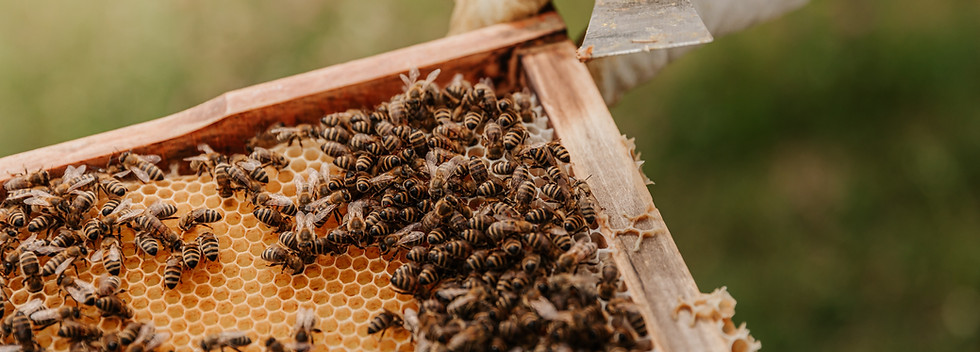top of page

New beekeepers Guide to buying bees
Package, Nuc or Swarm

Package
*.Sometimes a bit more difficult for new beekeepers. Most new beekeepers do not have drawn comb.
*3 to 5 lbs of bees in a transport box with a caged queen.
*Queen is not related to bees in the box.
*Can be mailed.
*Usually brought in from California
*Upfront cost a bit less than a nuc.
*3 to 5 lbs of bees in a transport box with a caged queen.
*Queen is not related to bees in the box.
*Can be mailed.
*Usually brought in from California
*Upfront cost a bit less than a nuc.
Nuc (Nucleus) Best Option for New Beekeepers
A nucleus (nuc) hive is an excellent choice for new beekeepers because it offers several advantages over other methods of starting a hive. Here are five reasons why a nuc hive is better for beginners:
1. Established and Balanced Colony
A nuc hive comes with a functioning mini-colony that includes a mated queen, worker bees, brood (eggs, larvae, and pupae), and resources like honey and pollen. This head start ensures faster growth compared to package bees.
2. Easier to Manage
Since the bees are already working together as a unit, the colony is more stable and less likely to abscond (leave the hive). Beginners can focus on learning hive management instead of troubleshooting colony establishment issues.
3. Faster Build-Up
With brood in various stages of development, the colony population grows quickly, allowing the hive to take advantage of the nectar flow sooner. This is critical for a successful first year.
4. Lower Risk of Queen Issues
Nucs come with a proven, laying queen who has already been accepted by the colony. This eliminates the risk of queen rejection or mating failure that can occur when introducing a new queen in package bees.
5. Starting with a nuc hive provides new beekeepers with a more straightforward and successful way to begin their beekeeping journey, giving them a stable foundation to learn and grow.
1. Established and Balanced Colony
A nuc hive comes with a functioning mini-colony that includes a mated queen, worker bees, brood (eggs, larvae, and pupae), and resources like honey and pollen. This head start ensures faster growth compared to package bees.
2. Easier to Manage
Since the bees are already working together as a unit, the colony is more stable and less likely to abscond (leave the hive). Beginners can focus on learning hive management instead of troubleshooting colony establishment issues.
3. Faster Build-Up
With brood in various stages of development, the colony population grows quickly, allowing the hive to take advantage of the nectar flow sooner. This is critical for a successful first year.
4. Lower Risk of Queen Issues
Nucs come with a proven, laying queen who has already been accepted by the colony. This eliminates the risk of queen rejection or mating failure that can occur when introducing a new queen in package bees.
5. Starting with a nuc hive provides new beekeepers with a more straightforward and successful way to begin their beekeeping journey, giving them a stable foundation to learn and grow.


Swarm
Here are five reasons why catching a bee swarm may be difficult for a new beekeeper:
Lack of Experience with Swarm Behavior
Understanding swarm behavior is crucial for locating and predicting where the bees will settle. New beekeepers may struggle to identify swarm cues or understand the swarm's tendency to cluster temporarily before moving to a permanent location.
Fear of Handling Bees
For a new beekeeper, the fear of being stung or handling a large cluster of bees can be intimidating. This fear may cause hesitation, shaky movements, or poor handling techniques, which can make capturing the swarm more difficult.
Improper Equipment or Setup
New beekeepers may not have the right tools or equipment prepared, such as a proper swarm box, ladder, or bee suit. Without a suitable hive or container ready for the bees, the swarm may leave before it can be caught.
Swarm Location
Swarms often settle in hard-to-reach places, such as high tree branches, walls, or dense shrubs. A new beekeeper may not have the skills or confidence to navigate these challenging areas safely or effectively.
Timing and Quick Action
Catching a swarm requires prompt action since swarms can leave their temporary cluster within hours or days. A new beekeeper may not react quickly enough or understand the importance of acting fast to capture the bees before they relocate.
Each of these factors can make the process challenging but improve with time, practice, and knowledge.
Lack of Experience with Swarm Behavior
Understanding swarm behavior is crucial for locating and predicting where the bees will settle. New beekeepers may struggle to identify swarm cues or understand the swarm's tendency to cluster temporarily before moving to a permanent location.
Fear of Handling Bees
For a new beekeeper, the fear of being stung or handling a large cluster of bees can be intimidating. This fear may cause hesitation, shaky movements, or poor handling techniques, which can make capturing the swarm more difficult.
Improper Equipment or Setup
New beekeepers may not have the right tools or equipment prepared, such as a proper swarm box, ladder, or bee suit. Without a suitable hive or container ready for the bees, the swarm may leave before it can be caught.
Swarm Location
Swarms often settle in hard-to-reach places, such as high tree branches, walls, or dense shrubs. A new beekeeper may not have the skills or confidence to navigate these challenging areas safely or effectively.
Timing and Quick Action
Catching a swarm requires prompt action since swarms can leave their temporary cluster within hours or days. A new beekeeper may not react quickly enough or understand the importance of acting fast to capture the bees before they relocate.
Each of these factors can make the process challenging but improve with time, practice, and knowledge.
bottom of page
.png)